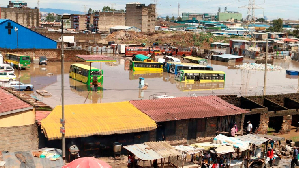- Home - News
- TWI News | TV
- Polls
- Year In Review
- News Archive
- Crime & Punishment
- Politics
- Regional
- Editorial
- Health
- Ghanaians Abroad
- Tabloid
- Africa
- Religion
- Election 2020
- Coronavirus
- News Videos | TV
- Photo Archives
- News Headlines
- Press Release
General News of Wednesday, 24 February 1999
Source: --
New century threatened by depletion of natural resources
Accra, (Greater Accra) 24 Feb. '99,
The World Watch Institute (WTI) has called for a concerted effort by governments to develop an environmentally sustainable global economy that can meet the demands of the next millennium. "Our analysis shows that we are entering a new century with an economy that cannot take us where we want to go. Satisfying the projected needs of eight billion or more people with the economy we now have is simply not possible," the non-profit making institute in the US, says. In its special millennium edition of the State of the World report, the WTI, therefore, recommends a new design principle that shifts from the depletion of natural resources to an economy that is based on renewable energy and that continually reuses and recycles materials. "A sustainable economy will be a solar-powered, bicycle/rail based one that uses energy, water, land and materials much more efficiently and wisely than we use today". The report says though the transformation may seem far- fetched, it can be achieved when the world sets itself to the task. "Just as the 19th century was marked by the abolition of slavery and the 20th century's perspective by a new international principle of human rights (adopted by the United Nations in 1948), the 21st century will require a new ethic of sustainability that includes the need to live within our ecological means. "We will need a new set of human responsibilities to the natural world and to future generations to go with our new found human rights". The report highlights the extensive damage to the environment and depletion of natural resources, including fisheries, biodiversity, and woodlands and says the consequences have been the spate in weather-related disasters. "The early costs of climate change may already be evident: weather-related economic damages of 89 billion dollars in 1998 exceeded losses for the decade of the 1980s. "In Central America, Hurricane Mitch killed 11,000 people, and Honduras suffered losses equivalent to one-third of its annual GDP". It advocates taxes on activities that degrade the environment to encourage the adoption of environmentally friendly technologies. "If coal burning is taxed, solar energy becomes more economically competitive. If auto emissions are taxed, cleaner forms of transportation become more affordable". The report also urges governments to implement the conventions on Climate Change and Bio-diversity. "So far, national governments have largely failed to effectively implement the last decades land mark environmental treaties on Climate Change and Bio-diversity. One of the challenges of the 21st century will be to fulfil their ambitious promises to stabilise the climate and slow the destruction of species". It points out that it is important for wealthy countries to address the problems of more than one billion people living in poverty as part of the efforts to promote efficient use of natural resources. GRi
Opinions









